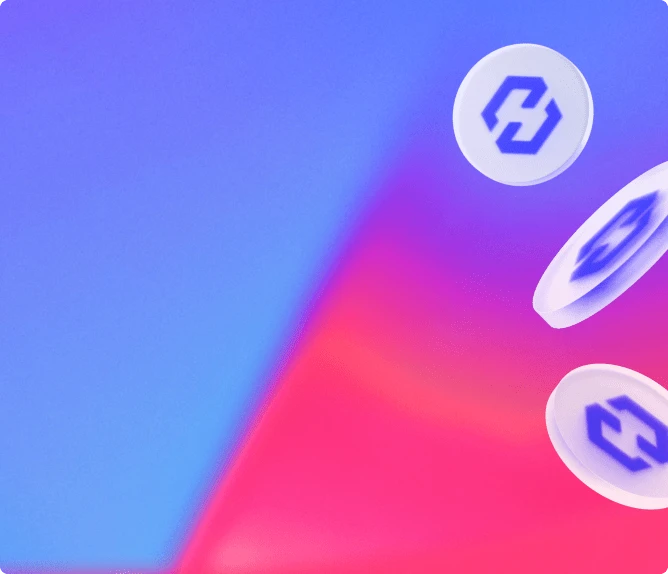Investing in crypto-assets carries risks of liquidity, volatility, and partial or total capital loss. Crypto-assets held are not covered by deposit and securities guarantee mechanisms.


Sign up for our newsletter
Partners
Coinhouse
Our accounts
Coinhouse
Coinhouse SAS with a capital of €210,000, RCS Paris 815 254 545, headquarters: 14 Avenue de l'Opéra 75001 Paris – support@coinhouse.com. Registered with the AMF for activities related to the purchase/sale of digital assets against legal tender, the exchange of digital assets for other digital assets, and the custody of digital assets for third parties under the registration number: E2020-001.
Coinhouse payment solutions
Company registered with the Paris RCS under the number 914 384 557, registered with the Prudential Control and Resolution Authority as a payment service agent under the number 727503 of the electronic money institution Treezor, headquartered at 33 Avenue de Wagram, 75017 Paris.
General conditions, disclaimers and legal documents.



Aptos is a Layer 1 blockchain that was launched in November 2022.
It was developed by Aptos Labs, an independent company founded by engineers from Meta (formerly Facebook).
Aptos aims to be a scalable, secure and reliable blockchain that can be used for a wide range of applications.
Aptos is designed to be scalable.
The blockchain can process up to 10,000 transactions per second, making it suitable for use by a large number of users.
Libra was a Layer 1 blockchain designed to be a global digital asset.
The blockchain also used a Proof-of-Stake consensus mechanism, but was designed to be managed by a consortium of 28 companies.
Libra met with strong opposition from regulators and legislators, and Meta finally abandoned the project in 2021.
Aptos is an evolution of Libra.
The blockchain uses the same underlying technology, but is designed to be more scalable and decentralized.
Aptos is not controlled by a consortium of companies, but by a community of validators.
Buy APT tokens onlmine.
The Libra era In 2019, Meta, formerly Facebook, announced the launch of a blockchain project called Libra.
This project aimed to create a new digital asset that would be accessible to everyone, regardless of their location or financial situation.
Aptos was born out of this Libra project.
It was a Level 1 blockchain that was designed to be the foundation of Libra.
Aptos was developed by a group of Meta engineers and researchers, including Mo Shaikh and Avery Ching.
In 2021, the Libra project was renamed Diem.
However, the project was abandoned in 2022, due to regulatory pressure and criticism from legislators and regulators, who saw it as direct competition with the US dollar.
LIBRA’s troubles with these institutions caused a gradual abandonment of the project by all the companies that had initially subscribed to it, especially Mastercard. The Aptos era After the Diem project was abandoned, Mo Shaikh and Avery Ching decided to continue developing Aptos as an independent project.
They set up a new company, Aptos Labs, to develop and support blockchain.
Aptos launched its mainnet on October 18, 2022.
This is a Level 1 blockchain that is designed to be secure, scalable and accessible to all.
Aptos uses the Move programming language, which was developed by Meta as part of the Libra project. Investors: – Coinbase Ventures is the investment arm of Coinbase – Jump Crypto is a crypto-asset investment company that has invested in a number of leading blockchain projects.
– Andreessen Horowitz is a leading venture capital firm that has invested in a number of leading tech startups, including Facebook, Twitter and Airbnb.
– Greylock Partners is a leading venture capital firm that has invested in a number of leading technology startups, including LinkedIn, Airbnb and Spotify.
– Sequoia Capital is a leading venture capital firm that has invested in a number of leading technology startups, including – Apple, Google and PayPal.
Unlike traditional blockchains that employ serial transaction execution, where transactions are processed one after the other, Aptos adopts parallel execution.
This approach enables multiple transactions to be executed simultaneously, capturing a snapshot of the current state and processing them in parallel.
While serial execution ensures confirmation of transaction status, it inherently limits scalability.
Aptos addresses this limitation by employing parallel execution, dramatically improving transaction throughput.
The challenge of parallel execution lies in preventing interference between different transactions.
Aptos has made significant progress in this area and is currently reporting impressive results on its testnet, with over 20,000 nodes and a transaction processing capacity of 10,000 transactions per second (TPS).
Aptos is aiming for an ultimate target of 100,000 TPS.
However, the actual achievement of this target and the stability of the network without downtime will be revealed once the mainnet is up and running.
– Coinbase: Coinbase announced in November 2022 that it would support the Aptos blockchain as a launch partner.
–Circle: Circle announced in November 2022 that it would support the Aptos blockchain as a launch partner.
–Consensys: Consensys announced in November 2022 that it would support the Aptos blockchain as a development partner.
–Google Cloud: Google Cloud announced in November 2022 that it would support the Aptos blockchain as an infrastructure partner.
–KYD Labs: KYD Labs announced in November 2022 that it would support the Aptos blockchain as a game development partner.
Aptos transactions are validated by a community of validators.
Validators are network nodes that have sequestered a certain number of APT tokens.
The sequestered tokens are put into play to secure the network and reward validators who validate transactions correctly.
Aptos uses a Proof-of-Stake (PoS) consensus mechanism to ensure that transactions are validated correctly.
The Aptos PoS consensus mechanism is designed to be safe and secure.
It is resistant to attacks and can process a large number of transactions per second.
– Transactions are validated per block.
A block is a set of transactions that are grouped together and validated at the same time.
– Validators are randomly selected to validate transactions.
The selection process is designed to be fair and to avoid collusion between validators.
– Validators are rewarded with APT tokens for validating transactions correctly.
Validators are penalized for validating transactions incorrectly.
The Move language is a state-of-the-art smart contract language developed by Diem.
To attract a wide range of developers to build applications for the new ecosystem, it’s crucial to have a language with which developers are already familiar.
Currently, popular programming languages in the blockchain space include Solidity, used by Ethereum, Avalanche (Avax), and BSC, as well as Rust, used by projects such as PolkaDot and Solana.
Move, being a brand-new language, introduces a learning curve for developers interested in creating on Aptos.
The existing pool of developers skilled in Move is limited, and the associated development tools may not be as comprehensive as those available for more established languages.
However, driven by projects like Aptos and Sui within the “Diem” ecosystem, and with the potential for wider adoption of Diem technology in the future, Move has the potential to evolve into one of the mainstream blockchain development languages.
Features and Benefits of the Move Language: One of Move’s promising features is the ability to define custom resource types, ensuring that resources can only be moved between program storage locations, rather than cloned or deleted.
To achieve high throughput and low latency, the Aptos blockchain uses a modular, pipelined approach to the key stages of transaction processing.
Specifically, transaction dissemination, block metadata scheduling, parallel transaction execution, batch storage and ledger certification all operate simultaneously.
This approach fully exploits all available physical resources, improves hardware efficiency and enables highly parallel execution.
The modular design of the Aptos architecture supports customer flexibility and is optimized for frequent and instant upgrades.
What’s more, to rapidly deploy new technological innovations and support new web3 use cases, the Aptos blockchain offers on-chain change management protocols.
For APTOS staking, it’s essential to choose a reliable and secure platform.
Once you’ve registered with Coinhouse, you can deposit your APTOS tokens in your wallet on the platform.
Then, look for the staking option in the user interface and follow the instructions to lock a certain number of your APTOS.
During the staking period, your tokens will be immobilized, but in return, you’ll start generating rewards according to the rate defined by the platform.
Thanks to Coinhouse’s reputation and expertise, you can rest assured that your investments are being managed with care and security.
The initial distribution of Aptos Tokens (APT) at the mainnet launch on October 12, 2022 was 1 billion tokens.
The APT will have a precision of 8 digits after the decimal point, the minimum unit being called Octa.
This pool of tokens is intended for ecosystem-related elements such as subsidies, incentives and other community growth initiatives.
Some of these tokens have already been allocated to projects built on the Aptos protocol and will be granted on completion of certain milestones.
The majority of these tokens (410,217,359,767) are held by the Aptos Foundation, and a smaller portion (100,000,000) is held by Aptos Labs.
These tokens are expected to be distributed over a ten-year period: – 125,000,000 APT initially available to support ecosystem projects, grants and other community growth initiatives, now and in the future, for the Community category – 5,000,000 APT initially available to support Aptos Foundation initiatives for the Foundation category – 1/120 of the remaining tokens for the Community and Foundation are expected to be unlocked each month for the next 10 years All current investors and major contributors are subject to a four-year lock-in schedule, excluding rewards from staking if applicable, from the launch of the mainnet, which is unlocked according to the following schedule: – No APT available for the first twelve months – 3/48ths of these tokens are unlocked on the 13th month after mainnet launch and every month thereafter up to and including the 18th month – 1/48th of the tokens are unlocked every month thereafter from the 19th month after mainnet launch, so that all these tokens are unlocked on the fourth anniversary of the mainnet launch Today, more than 82% of the network’s tokens are in play in all categories, and the majority of them are currently blocked in accordance with the above distribution schedule and are not available for sale.
Token holders who stake their tokens with a validator operator in order to secure the network and reach consensus may receive staking rewards.
Staking rewards are shared between validator operators and stakers and are not subject to distribution restrictions.
Currently, the maximum reward rate starts at 7% per year.
The maximum reward rate decreases by 1.5% p.a. to a lower limit of 3.25% p.a. (which should take more than 50 years).
These rewards increase the total offer of the Aptos network and depend on the amount staked and the validator’s performance.
Transaction fees are currently burned.
Even if it has yet to prove itself in terms of adoption by the crypto community, Aptos has a number of assets that set it apart from the competition: innovative technology enabling the management of thousands of transactions per second, a modern language enabling the development of decentralized applications rapidly, and above all, numerous partnerships and investors who decided to join the project based on the reputation of the original developers.
The Libra project’s descendants are bearing fruit here.
Only time will tell whether Aptos can become a serious competitor, particularly in the face of Ethereum.
Share the article


Download app